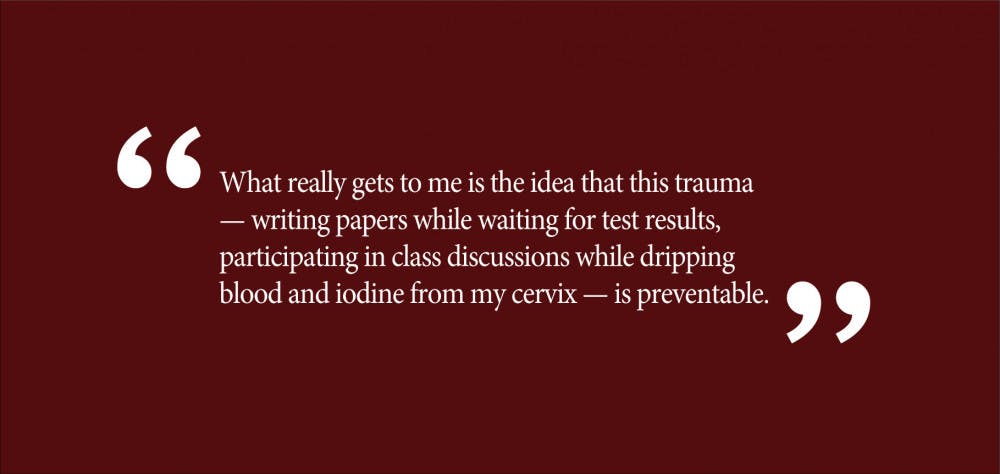There is currently a vaccine that could help prevent certain types of cancer, but many people are turning it down. The vaccine fights strains of the Human Papillomavirus, which can cause cervical, penile and anal cancer, but some students are still unprotected despite the fact that it’s been around for decades. The University should consider requiring the HPV vaccine for incoming students. In the meantime, current students should take it upon themselves to get the vaccine if they can.
HPV is an infection so common that most sexually active people will get it at some point in their lives. Many people with this infection never experience any symptoms and can even clear the virus from their body without ever knowing they had it. Two strains of HPV cause genital warts, an embarrassing if low-risk infection that can reduce quality of life. More problematic, however, are the 14 strains that can lead to cancer. HPV has been linked to the development of cervical cancer: HPV strains 16 and 18 cause 70 percent of cervical cancers and pre-cancerous lesions. Additionally, this virus can lead to certain types of cancer of the penis, anus, vulva, vagina and base of the tongue.
I tested positive for HPV 16 in 2013 during a routine physical and Pap Smear. Since then, I’ve had multiple colposcopies and cervical biopsies, where tiny bits of tissue are cut out of my cervix to test for precancerous lesions, and a Loop Electrosurgical Excision Procedure, meant to remove abnormal cervical cells. While neither procedure is particularly lengthy — I was out of the doctor’s office within the hour — it’s difficult to transition from having a pair of clippers inside your cervix to concentrating on your class lecture.
What really gets to me is the idea that this trauma — writing papers while waiting for test results, participating in class discussions while dripping blood and iodine from my cervix — is preventable.
The HPV vaccine protects against nine cancer-causing strains, including the dangerous and common strains 16 and 18. For college-age students, the vaccine is given in three doses over a period of about eight months. Though the vaccine does not treat HPV infection, it is still recommended for people who have already been infected with HPV as a way of preventing new infections and different strains of the virus.
Part of the stigma against the HPV vaccine has to do with the method of catching the virus. Many parents hesitate to vaccinate their children against HPV, thinking that their kids are not sexually active and therefore will not be exposed to the virus. By refusing to confront or acknowledge the sexual activity of their children, parents may end up putting them in harm’s way by leaving them vulnerable to the virus. Moreover, given the proliferation of HPV and the likelihood that a sexual partner has been infected, the best time to vaccinate against it is before you begin having sex. In an era already plagued with damaging anti-vax sentiments, finding additional reasons to refuse vaccination seems wildly unnecessary.
Effective advertising about the association between HPV and cervical cancer, perhaps counterintuitively, risks limiting the number of people vaccinated. Initially, the HPV vaccine was recommended only for those with cervixes. However, this recommendation and the continued association between the HPV vaccine and preventing cervical cancer left many thinking that they didn’t need the vaccine. But HPV is responsible for other types of cancer as well, including the back of the throat, which is a fairly universal component of the human body. Additionally, the failure to vaccinate everyone contributes to the spread of HPV.
Here at Brown, the choice to get vaccinated is in your hands. Many students who have just started college are for the first time in a position to take charge of their health care — which includes vaccinations.
Brown Health Services offers the HPV vaccine and encourages students to get it. However, as of now, students must make their own appointment with Health Services to receive all three doses of the vaccine. This process may seem complex or daunting, especially when compared with the ease of receiving a flu vaccine. But despite this slight added complexity, the HPV vaccine is free to students on the University’s Student Health Insurance Plan.
Take it from me — it’s incredibly important to get this vaccine. Even if you are eventually able to clear your strain of HPV, or if it does not fully develop into cancer, it can still negatively impact your life here at Brown and your experience as a student.
Brown Health Services has done a great job of advertising the HPV vaccine to me whenever I meet with a doctor, and as an HPV-positive married 30-something, I’m the least likely to need it. I can only imagine that they are pushing the vaccine for other, more at-risk demographics. But until we can ensure that everyone is vaccinated against HPV, many in our community are at risk. A full set of vaccinations against various diseases are required of incoming students, but currently the HPV vaccine is not included on that list.
The University should consider requiring this cancer-preventing vaccine as part of the set of inoculations required of all incoming students, and Brown Health Services could put further effort into advertising the availability and $0 cost for students on the SHIP plan. But in the meantime, we must take our health into our own hands and schedule appointments for the HPV vaccine. I’m lucky — despite the negative impact that HPV has had on my life and my studies, it hasn’t yet progressed into cancer. But if I had gotten vaccinated, it likely wouldn’t have happened at all.
E.L. Meszaros GS can be reached at e.l.meszaros@brown.edu. Please send responses to this opinion to letters@browndailyherald.com and op-eds to opinions@browndailyherald.com.





